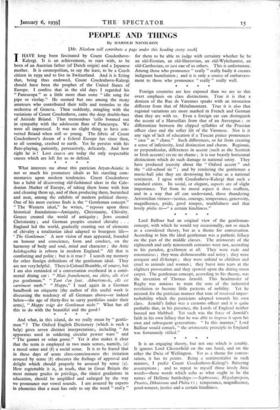Foreign countries are less exposed than we are to this
overt emphasis on class distinctions. True it is that a denizen of the Rue de Varennes speaks with an intonation different from that of Menilmontant. True it is also that regional variations are more marked in French and German than they are with us. Even a foreign ear can distinguish the accent of a Marseillais from that of an Auvergnat ; or differentiate between the clipped syllables of the Prussian officer class and the softer lilt of the Viennese. Nor is it any sign of lack of education if a Tuscan prince pronounces " casa " as " chasa." Such differences, so far from creating a sense of inferiority, lend distinction and charm. Regional, or perpendicular, differences in accent (such as the Scottish or Irish accents) create no shame ; it is our beastly horizontal distinctions which do such damage to national unity. They have produced jocosity about the " Oxford accent " and the " old-school tie " ; and by rendering the gentleman a music-hall joke they are destroying his value as a national sentiment. I agree with Coudenhove-Kalergi that such a standard exists. Its social, or elegant, aspects are of slight importance. Yet from its moral aspect it does reaffirm, and in a way that all can understand, those thundering Aristotelian virtues—justice, courage, temperance, generosity, magnificence, pride, good temper, truthfulness and that lovely philia tis—" a certain kindliness."
* * * *










































 Previous page
Previous page